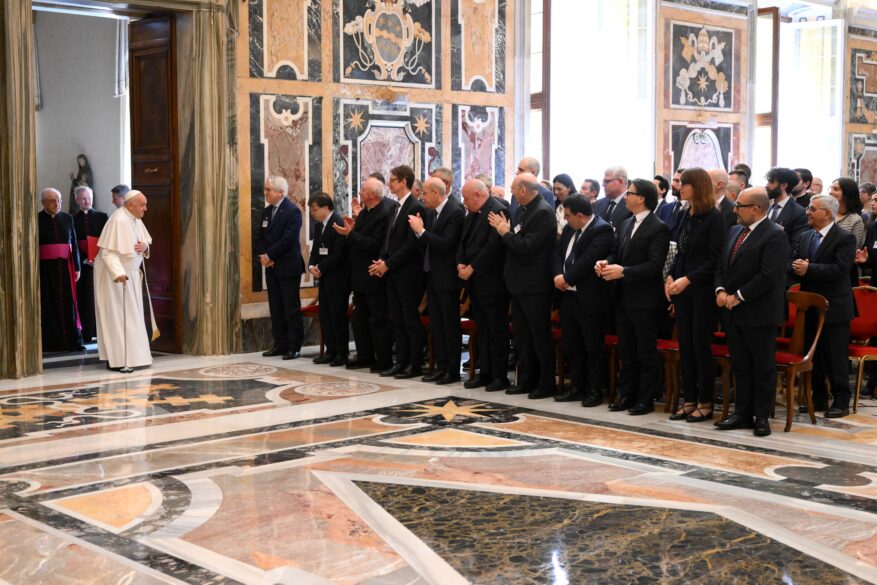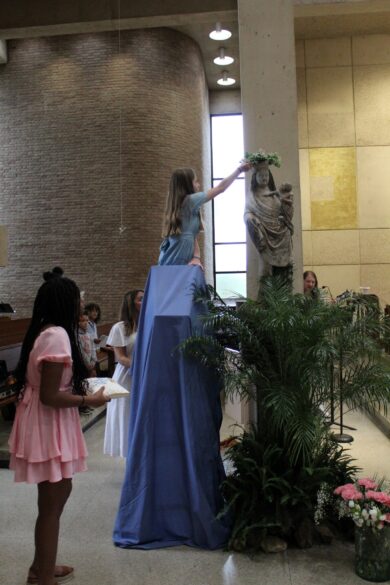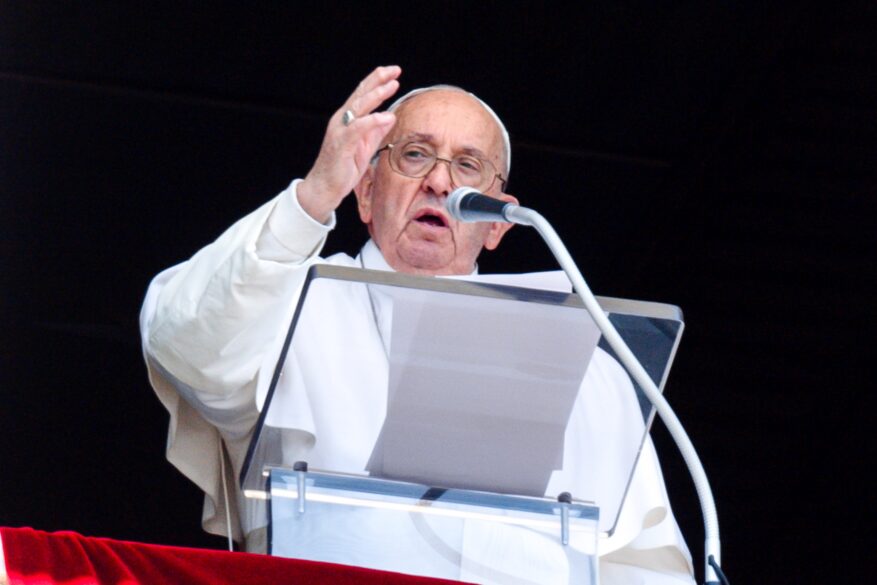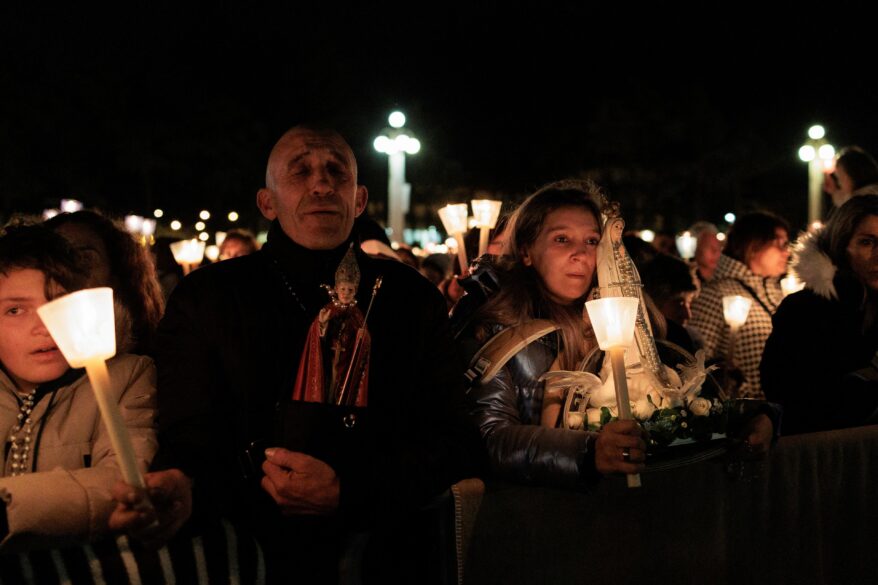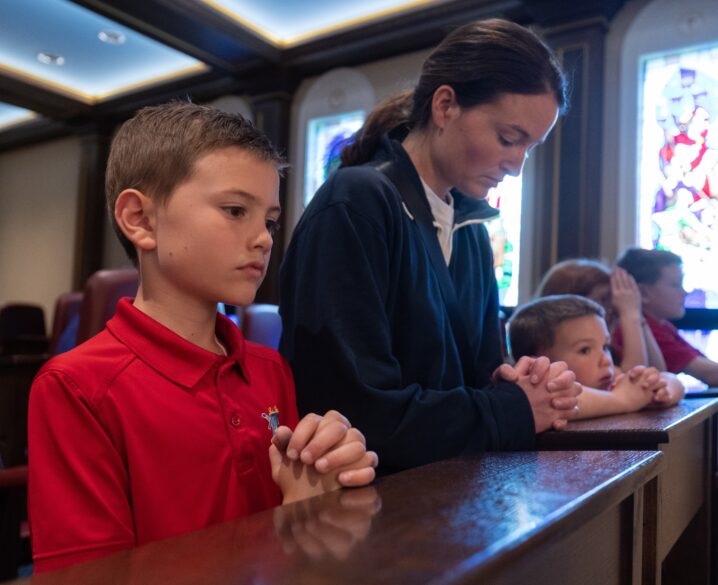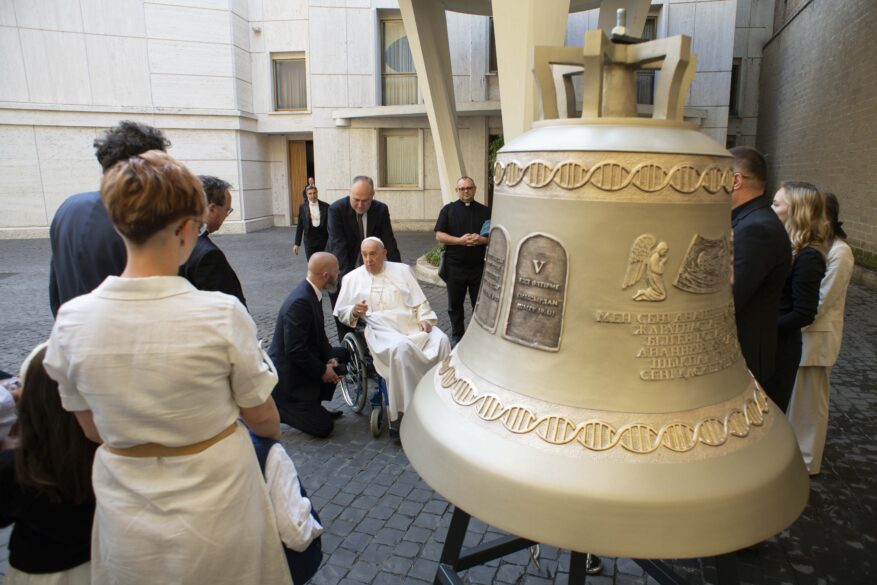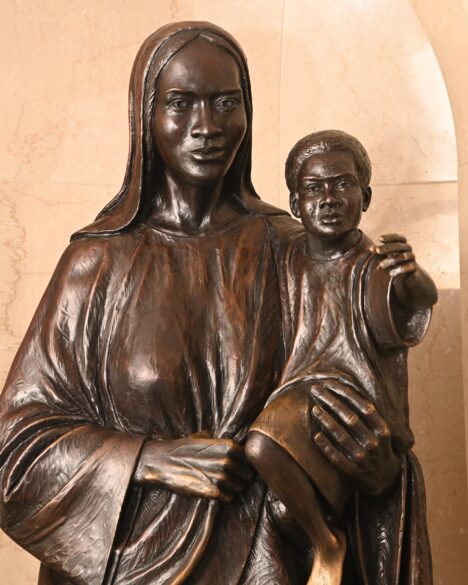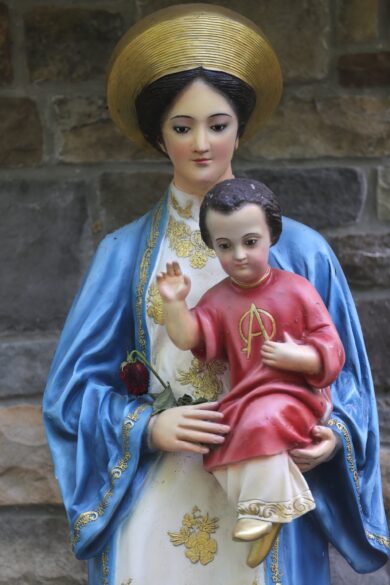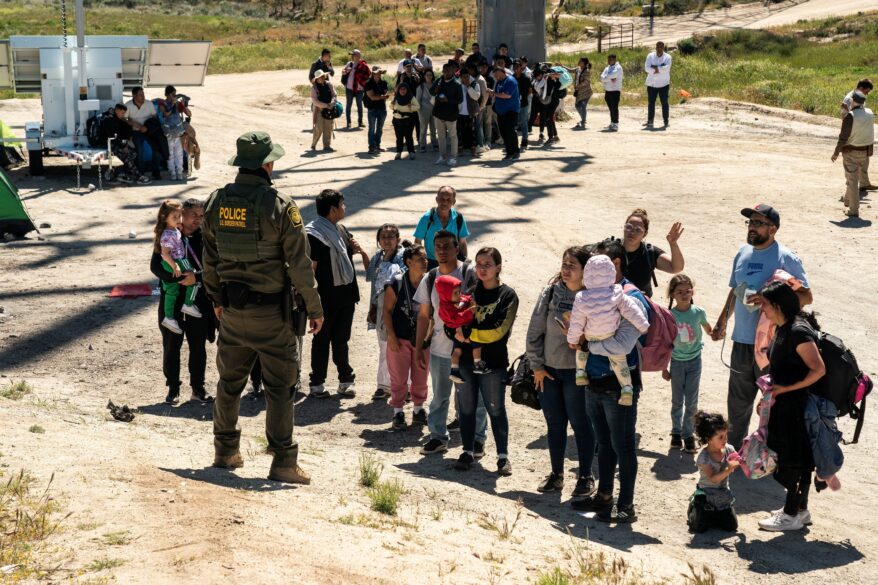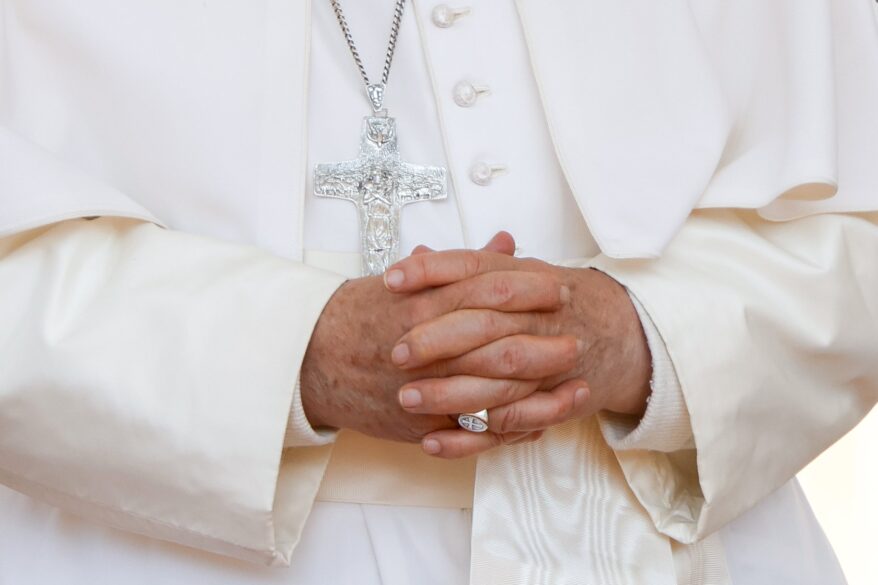By Gina Christian
(OSV News) – In the latest comment from the Vatican on “Fiducia Supplicans,” the controversial declaration issued by the Vatican’s Dicastery for the Doctrine of the Faith in December 2023 that includes guidelines on the blessing of same-sex couples, Pope Francis clarified that he didn’t allow blessings of “the union” but of “each person.”
“What I allowed was not to bless the union,” the pope said, correcting the question of CBS journalist and interviewer Norah O’Donnell, who stated within her question that the pope had “decided to allow Catholic priests to bless same-sex couples.”
“That cannot be done because that is not the sacrament. I cannot. The Lord made it that way,” said Pope Francis, according to the English translation provided in voiceover by CBS. “But to bless each person, yes. The blessing is for everyone. For everyone. To bless a homosexual-type union, however, goes against the given right, against the law of the church. But to bless each person, why not? The blessing is for all. Some people were scandalized by this. But why? Everyone! Everyone!”
The Spanish-language video, however, reveals that instead of “given right,” Pope Francis said “natural law,” which, as the Catechism of the Catholic Church teaches, “states the first and essential precepts which govern the moral life.”
“Fiducia Supplicans,” which sparked international uproar within the church, was just one of the many topics touched on in the wide-ranging interview that covered the pope’s thoughts on war, a “globalization of indifference,” conservativism in the church, antisemitism and U.S. policy toward migrants.
The pope spoke with O’Donnell April 24 at his residence, Casa Santa Marta (Domus Sanctae Marthae). A roughly 13-minute portion of the interview aired May 19 on “60 Minutes,” the long-running newsmagazine of the CBS Television Network, with the balance of the session to be broadcast in a one-hour primetime special May 20 on the network and on the Paramount+ streaming platform.
The pair were seated beneath a large image of Our Lady Undoer of Knots, a Marian devotion from 18th-century Germany that is a favorite of Pope Francis, who learned of it some 40 years ago from a nun he had met while he was completing his doctoral thesis in that nation.
As a follow-up to the topic of same-sex blessings, O’Donnell reminded Pope Francis of his previous remarks that “homosexuality is not a crime,” qualifying of “unjust” laws criminalizing the condition of same-sex attraction, which the church recognizes as “objectively disordered” while calling for such persons to exercise chastity and self-mastery, and to be treated with respect and compassion.
Homosexuality “is a human fact,” Pope Francis told O’Donnell.
She asked him how he would respond to “conservative bishops in the United States that oppose your new efforts to revisit teachings and traditions.”
In his reply, Pope Francis defined a conservative as the “suicidal attitude” of “one who clings to something and does not want to see beyond that.”
“One thing is to take tradition into account, to consider situations from the past, but quite another is to be closed up inside a dogmatic box,” he said.
Throughout the interview, Pope Francis underscored his soft-spoken but energetic responses — delivered in his native Spanish through an interpreter — with emphatic gestures, shifting occasionally in his chair and appearing to be in good health, despite a bout with bronchitis earlier this year that saw him taken to the hospital for tests.
Asked by O’Donnell if the Catholic Church had “done enough” to reform and repent of clerical sexual abuse, Pope Francis said “it must continue to do more” since “the tragedy of the abuses is enormous.”
He also stressed the need to “not only … not permit it but to put in place the conditions so that it does not happen.”
“It cannot be tolerated,” Pope Francis said. “When there is a case of a religious man or woman who abuses, the full force of the law falls upon them. In this there has been a great deal of progress.”
O’Donnell, in the May 19 excerpt, did not ask Pope Francis about Father Marko Rupnik, the Slovenian-born priest who was expelled from the Society of Jesus in June 2023, and who has gained international recognition both for his liturgical art and for the numerous accusations of sexual, spiritual and psychological abuse leveled against him in the course of his career.
O’Donnell did ask Pope Francis about the children of Gaza ahead of the Catholic Church’s inaugural World Children’s Day May 25-26, an observance instituted by the Vatican’s Dicastery for Culture and Education.
When O’Donnell, citing the United Nations, said that more than a million in Gaza, mostly children, would face famine on World Children’s Day, Pope Francis replied, “Not just in Gaza. Think of Ukraine.”
He said that many of the Ukrainian children who come to the Vatican “don’t know how to smile … they have forgotten how to smile. And that is very painful.”
As a follow-up question, O’Donnell asked if the pope had a message for Russian leader Vladimir Putin, who ordered the full-scale invasion of Ukraine in February 2022.
“Please, warring countries, all of them, stop. Stop the war,” replied Pope Francis. “You must find a way of negotiating for peace. Strive for peace. A negotiated peace is always better than an endless war.”
O’Donnell asked the pope how to address international division over the Israel-Hamas war, which has sparked “big protests on college campuses and growing antisemitism.”
“All ideology is bad, and antisemitism is an ideology, and it is bad,” said Pope Francis. “Any ‘anti’ is always bad. You can criticize one government or another, the government of Israel, the Palestinian government. You can criticize all you want, but not ‘anti’ a people. Neither anti-Palestinian, nor antisemitic. No.”
Asked by O’Donnell if he could help negotiate peace, the pope sighed and replied, “What I can do is pray. I pray a lot for peace. And also, to suggest, ‘Please, stop. Negotiate.'”
O’Donnell also asked Pope Francis for his thoughts on the state of Texas’ efforts to shutter Annunciation House, a Catholic nonprofit sheltering migrants at the U.S.-Mexico border.
“That is madness. Sheer madness. To close the border and leave them there, that is madness,” he said. “The migrant has to be received. Thereafter you see how you are going to deal with him. Maybe you have to send him back, I don’t know, but each case ought to be considered humanely.”
Recalling the pope’s July 2013 visit to Lampedusa — the Italian island to which thousands of migrants have fled, with thousands more perishing while crossing the Mediterranean — O’Donnell asked Pope Francis to speak about “the globalization of indifference.”
“People wash their hands!” he answered. “There are so many Pontius Pilates on the loose out there … who see what is happening, the wars, the injustice, the crimes … (They say), ‘That’s OK, that’s OK’ and wash their hands. … That is what happens when the heart hardens … and becomes indifferent.
“Please, we have to get our hearts to feel again,” Pope Francis implored. “We cannot remain indifferent in the face of such human dramas. The globalization of indifference is a very ugly disease. Very ugly.”
No reference was made to another hot button topic: women in the clergy, except in a post-interview narration in which O’Donnell said that although the pope had appointed more women to positions of church power than his predecessors, “he told us he opposes allowing women to be ordained as priests or deacons.”
In a particularly poignant moment in the interview, O’Donnell asked the pope about the church’s rejection of surrogacy, saying she knows women who are cancer survivors for whom the practice has become “the only hope” for having a child.
Pope Francis reaffirmed church teaching on the point, saying that surrogacy has sometimes “become a business, and that is very bad.”
He also said that for infertile women, “the other hope is adoption,” and stressed that “in each case the situation should be carefully and clearly considered, consulting medically and then morally as well.”
The pope commended O’Donnell for her sensitivity toward people that “in some cases (surrogacy) is the only chance,” saying with a warm smile, “It shows that you feel these things very deeply. Thank you.”
O’Donnell, in turn, said the pope has inspired hope among many “because you have been more open and accepting perhaps than any other previous leaders of the church.”
Reiterating a cry he issued at World Youth Day 2023 in Lisbon, Pope Francis said that the church is open to “everyone, everyone, everyone.”
“The Gospel is for everyone,” he emphasized. “If the church places a customs officer at the door, that is no longer the church of Christ.”
The May 19 segment concluded with O’Donnell asking the pope what gave him hope.
“Everything,” Pope Francis said. “You see tragedies, but you also see so many beautiful things … heroic mothers, heroic men, men who have hopes and dreams, women who look to the future. That gives me a lot of hope. People want to live. People forge ahead. And people are fundamentally good. We are all fundamentally good. Yes, there are some rogues and sinners, but the heart itself is good.”
(Gina Christian is a multimedia reporter for OSV News. Follow her on X (formerly Twitter) at @GinaJesseReina.)
